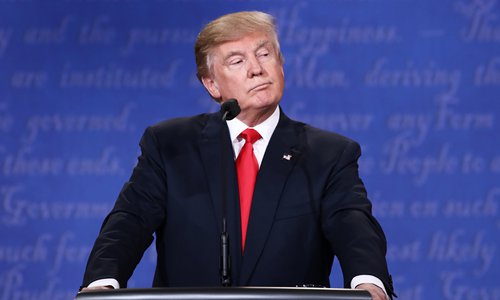HOME >> OPINION,SPECIAL-COVERAGE
US policies can cause global recession: expert
Source:Global Times Published: 2019/6/24 18:23:40

Photo: VCG
Editor's Note:
The US has increased trade conflict with China, and also Europe. What was the primary reason for Washington to start the trade dispute with them? Will China and Europe further expand cooperation to deal with US unilateral and protectionist behavior? Global Times (GT) reporter Lu Yuanzhi interviewed Professor Danilo Türk (Türk), former president of the Republic of Slovenia from 2007 to 2012 and a senior visiting fellow at the Chongyang Institute for Financial Studies, Renmin University of China, on these issues.
GT: The US has launched a trade war with China and the trade friction between the US and EU has also increased. Why did Washington start the trade dispute with them?
Türk: The reasons are political and are of two types. First, there is the fear that China's growth represents a threat to US leading role in the world. That fear seems to be widespread among US political and business elites. Therefore, preemptive action of some kind is deemed acceptable and that includes the use of tariffs as a weapon.
The second reason is the process of globalization in the past decades. Globalization has left many people behind. This has created an atmosphere of resentment among voters in many countries and the consequent support of the political parties and leaders who see enemies in everybody and everything that has to do with globalization.
In the US, these two tendencies have converged and have found a strong, although not generally shared, expression in the slogan "America First". Trade disputes are a consequence of all this. The US tariffs and other protectionist measures are chiefly, but not exclusively, directed against China. Europe and a few others are also on the receiving end.
GT: The US has urged its European allies to exclude Huawei from their 5G network development. What role does the US want Europe to play in its trade war with China?
Türk: It is understandable that the US wishes to have as many allies as possible in its trade war with China. However, in reality, it is becoming more isolated. 5G is a good example. The US argument that 5G represents a security threat is not shared among all. European countries are considering using 5G. Naturally, new technology requires new solutions for the protection and security of its users. But this is the task which goes with the introduction of new technology. Rejection of technological development is not a way forward.
GT: What is the negative impact of Washington's unilateralism and protectionism? How will they affect the current international order and global economy?
Türk: The tariff hikes introduced by the US against China have already created negative effects globally. This has been recently reported, among others, by the International Monetary Fund (IMF).
IMF economists estimated that if the US follows through with the tariffs against China imports, the tariffs from this year alone will reduce 0.3 percent off global GDP in 2020, with an additional 0.2 percent drag coming from US tariffs put in place last year.
The consequences are global because supply chains are global and the weakening of production in China has spread to China's major trading partners. Europe has already felt this.
According to a recent article in the New York Times, the overall German industrial production contracted sharply in April, falling 1.9 percent on the month versus the 0.5 percent analysts had expected. In addition to the existing tariff hikes, the US is considering a 25 percent tariff on global automobile imports. This would be a radical measure based on the theory that car imports could represent "a threat to national security". If that policy materialized in the US, it would create another shock for the global economy.
All of this could result in global recession. It has to be understood that the consequences of the US policies may last - even if terminated in the not too distant future. If they continued as proposed, the consequences could be a protracted global recession.
GT: How should China and European countries cope with US unilateralism and trade protectionism?
Türk: It is necessary they coordinate their reactions to the current trade war. The G20 summit in Osaka will be an important opportunity for China, the EU, Japan and other players to get behind a position that defends economic normalcy and multilateral management of international trade.
GT: How can the China-proposed Belt and Road Initiative bridge the divide in Europe? In the future, will China and Europe expand cooperation within the BRI framework?
Türk: It is important to understand history. Historically, Europe has been divided into its more developed West and less developed East. More recently, the Cold War added an unfortunate political layer to that division.
After the Cold War ended, that political layer of division was removed and Central and Eastern Europe developed more dynamically owing to the political change, economic reform, and investments from the West.
EU expansion in Eastern Europe after 2004 was a major step forward. However, the deeper economic and social division between East and West in Europe has remained not as dramatic as before but is still real. In addition, some of the countries of Southeastern Europe have not been able to join the European Union despite their wishes.
In this situation, additional investment from China into the 16 countries of Central and Eastern Europe, in particular with regard to infrastructure, represents a welcome contribution to the speedy development of that European region and overcoming historically inherited divides.
Also, it has to be understood the 16 countries represent less than 10 percent of Chinese investments in Europe. So, the 16 + 1 cooperation, as part of the BRI, comes as a welcome and timely contribution to development.
Naturally, projects that make up this cooperation have to be demand-driven and carried out within a legal framework. A win-win outcome is a very realistic proposition given the current circumstances.
Posted in: VIEWPOINT,COMMENTS